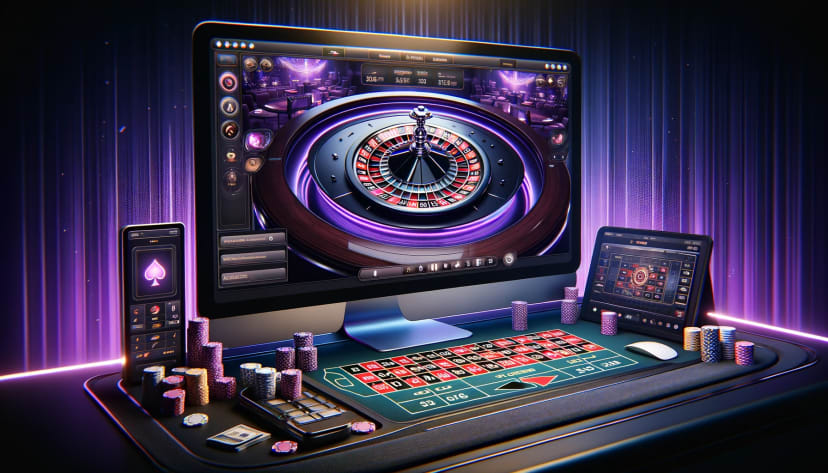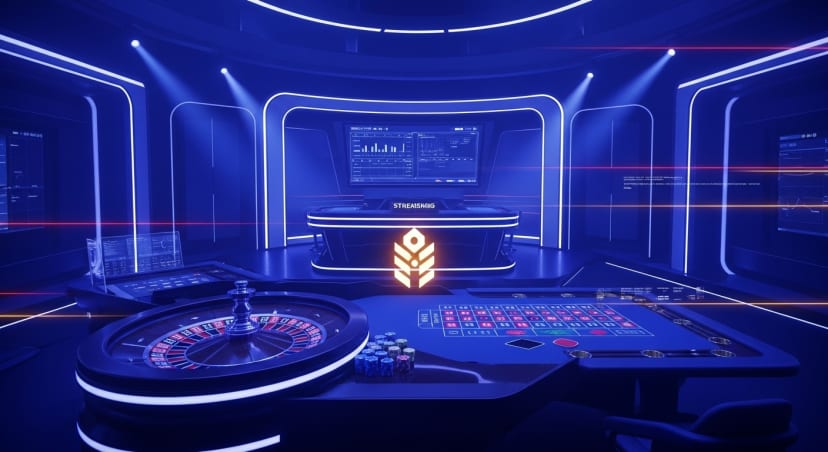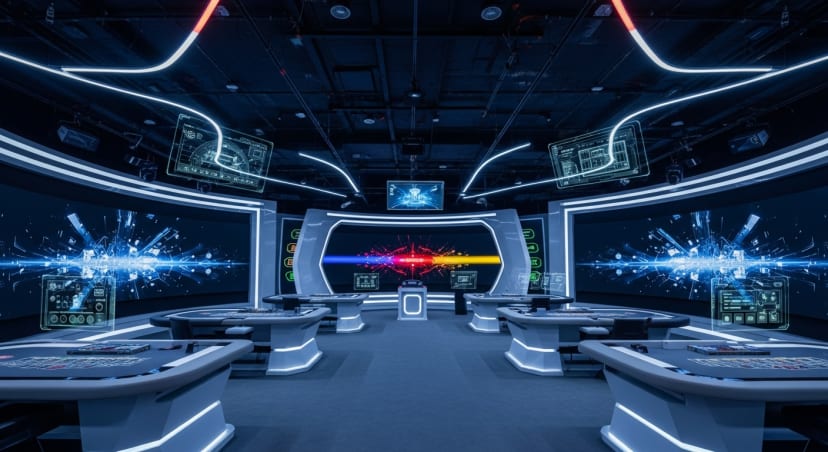To pick the online roulette experience that truly suits you, understanding the differences between Live Roulette and Online (RNG) Roulette is key for players here in New Zealand. While the basic rules are the same, how they're played, how you interact, and the general feel can be quite different. This guide dives into those distinctions, helping you make a solid choice based on things like game speed, the interface you see, building trust, and whether you're after a bit of social buzz or a straightforward game. By comparing the real-time, dealer-led version with the computer-generated one, you can ensure your preferences align with the right format for maximum enjoyment and strategy.
Live vs. Online Roulette: What's the Real Gurn?
Setting the Scene: Live Studio vs. Digital World
The most obvious difference you'll notice is the game environment. With live roulette, everything is streamed live from a professional studio, much like a real casino floor. You'll watch a real wheel spin and place your bets on a digital table, all while taking in the action through high-definition video. It's designed to give you that authentic, land-based casino vibe, complete with realistic sounds and professional backgrounds.
Online roulette, often called RNG (Random Number Generator) roulette, is entirely virtual. It uses smart computer algorithms and graphics to simulate the wheel spin and ball drop. The results are generated by certified software, not a physical mechanism. This means you get a purely digital experience, usually with a cleaner, more straightforward interface, without any live video feeds or studio elements.
Who's Running the Show? Dealer or Digital?
Another big difference is the human element. Live roulette has a real-life croupier who actually spins the wheel, calls out the results, and can even chat with players. They'll greet you, respond to messages, and add that social touch that makes the game feel more genuine. This is brilliant for Kiwis who enjoy a bit of banter or the atmosphere of a proper casino.
Online RNG roulette, on the flip side, doesn't have a human dealer. Everything is automated by the software – the wheel spins, the ball lands, and that's that. There's no chat function or personal interaction. It’s efficient but can feel a bit sterile if you're looking for that personal connection. Players who prefer to just focus on the numbers or play without distractions often find this version suits them best.
Pace of Play: Quick Fire or Leisurely Spin?
Game speed is a massive factor in how you'll enjoy your session. Online roulette games fly by because they skip the real-world delays of a live broadcast, dealer actions, and time for players to decide. A spin can be over in seconds, meaning you can get loads of rounds in quickly. This is perfect if you're keen to place bets rapidly or like to follow fast-paced strategies.
Live roulette, by its very nature, is slower. The dealers need time to take bets, spin the wheel, and wait for the ball to settle. Plus, there are natural breaks needed for video sync and for players to chat. While this more relaxed pace adds to the realism and tension, it might not be for players who want non-stop action. It really comes down to whether you prefer the immersive speed of online or the suspenseful pace of live.
Access and Availability: When and Where Can You Play?
Availability is a notable differentiator between live roulette and online (RNG) roulette. Online roulette games are available 24/7 without any restrictions on player count or session timing. Because these games are fully automated, there are no operational dependencies like live dealer schedules or streaming capacity. Players can instantly load the game and start playing without delay, making it an ideal choice for quick access at any time.
In contrast, live roulette tables may have limited access, especially during high-traffic hours. Although many live dealer casinos operate live games around the clock, some tables are subject to dealer shifts, studio maintenance, or limited seat availability. Players may occasionally encounter full tables or brief wait times, particularly in VIP or high-limit rooms. This makes online roulette the more consistently accessible option, particularly for casual or mobile players.
Betting Limits and Options
The betting range and customization options differ significantly between the two formats. Live roulette often features a wider spectrum of betting limits, catering to both low-stakes players and high rollers. It’s common to find tables with minimum bets starting at $0.50 and maximum limits reaching $10,000 or more. Many platforms offer multiple tables with varying stakes, allowing users to choose based on their bankroll and risk tolerance.
Online roulette, on the other hand, typically has preset limits defined by the software. While this ensures consistency and simplicity, it may restrict high-stakes betting. Minimum bets often start at $0.10 or $0.20, and maximums usually cap at a few hundred dollars, depending on the game provider. Additionally, some advanced betting features—like custom table settings or unique side bets—are more prevalent in live versions.
Visuals and Interface
In terms of visual presentation, online roulette is characterized by sleek digital animations and user-controlled interfaces. Players can adjust camera angles, switch views, and customize table layouts. This results in a fast, responsive, and intuitive user experience.
Live roulette, by contrast, integrates real-time video feeds with an overlaid betting interface. While this enhances immersion, it can feel more rigid in terms of navigation and responsiveness. The quality of the stream depends on the user’s connection, and interface elements may vary across providers. Players who prioritize aesthetics and control may prefer the highly polished graphics of online roulette.
Trust and Transparency
Trust is a fundamental consideration in roulette gameplay. Live roulette builds confidence by showing every spin in real time. Players can watch the ball land and see the dealer's actions, creating a transparent and verifiable environment.
Online roulette relies on RNG algorithms to ensure fair outcomes. While these systems are independently tested and certified by authorities like eCOGRA or iTech Labs, the absence of visual proof can make some users skeptical. For players who value visible authenticity, live roulette often feels more trustworthy.
Technical Requirements
The technical demands of live and online roulette differ significantly, especially regarding internet connectivity and device performance. Live roulette requires a stable, high-speed internet connection to stream real-time video feeds smoothly. Lag, buffering, or dropped frames can negatively impact the gaming experience. Users also need devices with sufficient processing power and memory—especially on mobile—to handle live streaming, interactive chat, and interface overlays simultaneously.
In contrast, online (RNG) roulette is far more resource-efficient. Since the game relies solely on digital animations and local processing, it consumes less bandwidth and performs well even on older devices or slower networks. This makes it the preferred option for players using lower-end smartphones, tablets, or limited mobile data plans. For optimal performance, live roulette favors controlled environments, while online roulette offers broader accessibility across various hardware profiles.
Game Variants and Customization
Both formats offer roulette variants, but their scope and availability differ. Online roulette provides a larger selection of game types and innovative customizations. Players can choose from European, French, and American versions, as well as unique adaptations like Mini Roulette, Multi-Wheel Roulette, Turbo Roulette, and 3D-rendered tables. Many RNG-based games also allow customization of the table layout, sound effects, and spin speed, offering a personalized and versatile experience.
Live roulette, while more immersive, tends to offer fewer variant types due to logistical constraints. Most live casino providers stick to classic formats such as European and American Roulette, with occasional branded or immersive tables. However, some advanced live versions—like Lightning Roulette or Double Ball Roulette—do introduce visual effects or multipliers while still maintaining live interaction. Customization, though, is limited in live formats due to the structured nature of streamed games and fixed studio setups. Explore the list of top 10 live roulette games to check by yourself if the live variants are diverse enough.
Bonuses and Promotions
Bonuses and promotions are another key differentiator. Online roulette is often included in casino welcome bonuses, deposit matches, and free spin promotions, although with wagering contributions typically lower than slot games. RNG roulette is commonly eligible for loyalty programs and cashback offers, making it attractive for bonus-focused players.
In contrast, live roulette is frequently excluded from standard promotions due to its lower house edge and slower play rate, which reduce casino profit margins. When bonuses are available for live games, they tend to be specialized, such as live table tournaments or specific live cashback days. Players should always read bonus terms carefully, as wagering contributions can differ drastically between live and online roulette formats.
Summary Table: Live vs. Online Roulette Comparison
| Feature | Live Roulette | Online (RNG) Roulette |
|---|---|---|
| Game Environment | Real-time video stream from a physical casino studio | Fully digital with computer-generated graphics |
| Dealer Interaction | Human dealer with live chat support | No human interaction; automated gameplay |
| Game Speed | Slower, with natural pauses and real dealer actions | Fast-paced; spins completed in seconds |
| Availability | May have table limits or dealer shifts | Always accessible; no restrictions |
| Betting Limits | Wider range; high-stakes tables often available | Predetermined by software; typically lower limits |
| Visual Interface | Video stream + digital overlay | Highly customizable and responsive UI |
| Trust Factor | High; visible spins and dealer activity | RNG-certified fairness; less visually transparent |
| Technical Needs | Requires strong internet and modern devices | Low bandwidth and system requirements |
| Game Variants | Fewer, mostly traditional (European, American) | Many unique and fast-paced variants |
| Bonuses & Promotions | Rarely eligible for general bonuses | Commonly included in promotions and rewards |
Ultimately, it’s up to you to decide which game format you prefer! Our advice: try both to make your own choice. Also, don’t forget to explore live roulette casinos to get even more insights into the different game options!
FAQ
What's the main difference between live roulette and online roulette in New Zealand?
The primary difference is the format: live roulette uses real-time video with a human dealer, offering a more social experience, while online roulette is fully digital, relying on RNG (Random Number Generator) software for results.
Is playing live roulette a better option for Kiwi players?
Live roulette provides a more immersive and authentic experience compared to standard online roulette. It features real dealers, physical wheels, and a social atmosphere via live chat. While gameplay might be slower with potentially higher minimum bets, many players in New Zealand prefer it for its transparency and realistic casino feel.
Which roulette version offers faster gameplay?
Online roulette is considerably faster due to instant spin results and automated processes, making it suitable for players who enjoy rapid betting cycles.
Is live roulette more trustworthy than online roulette for players in New Zealand?
Both formats are designed to be fair, but live roulette provides visual transparency with a real wheel and dealer, which some players find more reassuring than RNG-based outcomes. Always play at licensed casinos to ensure fair play.
Can I play live roulette on my mobile in New Zealand?
Yes, but live roulette requires a stable, high-speed internet connection and a modern smartphone or tablet to stream the video feed smoothly. Check your data plan, as live games can use a significant amount of data.

















